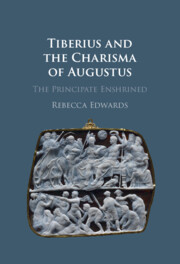Book contents
- Tiberius and the Charisma of Augustus
- Tiberius and the Charisma of Augustus
- Copyright page
- Contents
- Figures and Tables
- Acknowledgements
- Abbreviations
- Introduction
- Chapter 1 Augustan Charisma and Its Transfer
- Chapter 2 Tiberius and the Imperial Cult
- Chapter 3 Charismatic Precedents
- Chapter 4 The Power of Images of Augustus in the Age of Tiberius
- Chapter 5 Charismatic Images of Augustus in Tiberian Authors
- Chapter 6 Maiestas and the Protection of Augustan Charisma
- Conclusions
- Bibliography
- Index
- Tiberius and the Charisma of Augustus
- Tiberius and the Charisma of Augustus
- Copyright page
- Contents
- Figures and Tables
- Acknowledgements
- Abbreviations
- Introduction
- Chapter 1 Augustan Charisma and Its Transfer
- Chapter 2 Tiberius and the Imperial Cult
- Chapter 3 Charismatic Precedents
- Chapter 4 The Power of Images of Augustus in the Age of Tiberius
- Chapter 5 Charismatic Images of Augustus in Tiberian Authors
- Chapter 6 Maiestas and the Protection of Augustan Charisma
- Conclusions
- Bibliography
- Index
Summary
The first four principes after Augustus all ruled by virtue of their relationship to the founder of the principate. By the end of the reign of Nero, few men were left who could claim to be descended from Divus Augustus. This led to a series of civil wars, won by a man who had no familial relationship with the domus Augusta. By AD 69, the position of princeps had been codified beyond the hereditary charisma of Augustus. But as we see in the lex de imperio Vespasiani, the Senate recognized the legal claim of Vespasian to rule as princeps was based on the original position created by Augustus, a position solidified by the attitude and actions of Augustus’ successor, Tiberius.
- Type
- Chapter
- Information
- Tiberius and the Charisma of AugustusThe Principate Enshrined, pp. 207 - 209Publisher: Cambridge University PressPrint publication year: 2024

